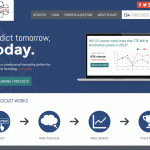 Since the Wisdom of Crowds first brought the power of aggregated opinion to the popular consciousness, prediction markets have grown in popularity. Last year for instance, CrowdMed launched as a prediction market for healthcare, where people were invited to predict the diagnosis of a patients condition. The Adam Smith Institute even teamed up with bookmakers Paddy Power to see if the crowd could accurately predict economic movements.
Since the Wisdom of Crowds first brought the power of aggregated opinion to the popular consciousness, prediction markets have grown in popularity. Last year for instance, CrowdMed launched as a prediction market for healthcare, where people were invited to predict the diagnosis of a patients condition. The Adam Smith Institute even teamed up with bookmakers Paddy Power to see if the crowd could accurately predict economic movements.
There are also an increasing number of case studies of companies using prediction markets internally. IBM for instance have been trialling a project whereby employees are given a small sum of money to back projects they believe are ripe for success.
Despite the growing application of such mechanisms, the announcement by George Mason University last week deserves some attention. On January 10th they launched what they believe is the largest and most advanced science and technology prediction market in the world.
The service, known as SciCast, aims to improve the accuracy of science and technology forecasting. The market covers a wide range of topics, with some interesting ones already emerging. For instance, SciCast give Amazon a 50% chance of using drones to deliver our packages by 2017.
SciCast operates as a combinatorial prediction market. Whereas in standard prediction markets, you have users spending points/currency to make their predictions, with this currency influencing both the reputation of the predictions and the forecasters. In a combinatorial prediction market however, forecasts can influence each other. So, for instance, if one forecast predicts a rise in climate change, and another sees people betting heavily on a solar power breakthrough, these forecasts will automatically talk to each other, thus making this kind of prediction market more complex, and hopefully more effective, than other forms of prediction market.
SciCast topics include agriculture, biology and medicine, chemistry, computational sciences, energy, engineered technologies, global change, information systems, mathematics, physics, science and technology business, social sciences, space sciences and transportation.
“With so many science and technology questions, there are many niches,” says Twardy, a researcher in the Center of Excellence in Command, Control, Communications, Computing and Intelligence (C4I), based in Mason’s Volgenau School of Engineering.
“We seek scientists, statisticians, engineers, entrepreneurs, policymakers, technical traders, and futurists of all stripes to improve our forecasts, link questions together and pose new questions.”
The site is already proving popular, with over 1,000 experts and enthusiasts signed up. With a gamification element rewarding people for accurate predictions, there will no doubt be a significant amount of prestige attached to sitting atop the leaderboard.
Time will tell how successful the site is at improving the technological forecasts we make. Go to https://scicast.org to register and get forecasting.
This strategy is more similar to the forecast marketplaces that have been growing around the world. SciCast for example are a latest access into this field, providing a range of technology related